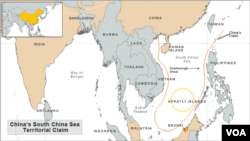Japan's government has agreed to buy a group of East China Sea islands at the center of a heated territorial dispute with China.
Japanese media reported Wednesday that the central government will pay private Japanese landowners $26 million for the three main islands in the chain, known as Senkaku in Japan and Diaoyu in China.
The mostly uninhabited islands are controlled by Japan, but claimed by China and Taiwan. They sit on top of what are thought to be vast oil deposits and have a long history of straining relations between China and Japan.
Chinese Foreign Ministry spokesperson Hong Lei called the reported purchase "illegal and invalid," saying Beijing will take "necessary measures to defend its national territorial sovereignty."
Japanese Chief Cabinet Secretary Osamu Fujimura would not confirm that Tokyo has struck a deal with the Japanese family that owns the islands, but said talks were under way.
"Of course, we are negotiating with the owner while we try to grasp where the situation stands between [the central government] and the Tokyo metropolitan government. I cannot talk about the content of our discussions whatsoever as they are still in process," said Fujimura.
Earlier this year, Tokyo's outspoken nationalist governor, Shintaro Ishihara, offered to have his metropolitan government buy the islands, saying Japanese leaders were not doing enough to protect the territory from Chinese claims.
Observers say Ishihara's move effectively forced the hand of Tokyo's central government, which is anxious to avoid a confrontation with Beijing. China does not recognize the Japanese family's ownership of the islands, and has repeatedly warned against Tokyo's attempts to purchase them.
Tensions involving the islands were further raised in August when Japan arrested a group of pro-China activists who planted a Chinese flag on the islands in support of Beijing's claim. The activists were quickly deported, but the event prompted a series of anti-Japan demonstrations across China. Last week in Beijing someone ripped the national flag off the Japanese ambassador's car, in the latest flare-up.
Japanese media reported Wednesday that the central government will pay private Japanese landowners $26 million for the three main islands in the chain, known as Senkaku in Japan and Diaoyu in China.
The mostly uninhabited islands are controlled by Japan, but claimed by China and Taiwan. They sit on top of what are thought to be vast oil deposits and have a long history of straining relations between China and Japan.
Chinese Foreign Ministry spokesperson Hong Lei called the reported purchase "illegal and invalid," saying Beijing will take "necessary measures to defend its national territorial sovereignty."
Japanese Chief Cabinet Secretary Osamu Fujimura would not confirm that Tokyo has struck a deal with the Japanese family that owns the islands, but said talks were under way.
"Of course, we are negotiating with the owner while we try to grasp where the situation stands between [the central government] and the Tokyo metropolitan government. I cannot talk about the content of our discussions whatsoever as they are still in process," said Fujimura.
Earlier this year, Tokyo's outspoken nationalist governor, Shintaro Ishihara, offered to have his metropolitan government buy the islands, saying Japanese leaders were not doing enough to protect the territory from Chinese claims.
Observers say Ishihara's move effectively forced the hand of Tokyo's central government, which is anxious to avoid a confrontation with Beijing. China does not recognize the Japanese family's ownership of the islands, and has repeatedly warned against Tokyo's attempts to purchase them.
Tensions involving the islands were further raised in August when Japan arrested a group of pro-China activists who planted a Chinese flag on the islands in support of Beijing's claim. The activists were quickly deported, but the event prompted a series of anti-Japan demonstrations across China. Last week in Beijing someone ripped the national flag off the Japanese ambassador's car, in the latest flare-up.






